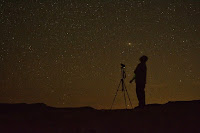Introduction and Monthly Reminders
Another couple of weeks have gone by without any serious stargazing. The days I planned on taking my gear out to the Utah West Desert started off beautifully. Shortly before leaving, the clouds rolled in, putting a halt to my plans. One of these days I will catch a break! I was able to see Venus, Mars, and Saturn in the early morning sky, but have yet to see Jupiter.
The Full Moon will occur on the 16th, the day after this post. About a week later, on the 22nd, the Lyrid Meteor Shower will peak. Remember that these meteors will appear to radiate from the constellation Lyra. Observers can expect to see about 20 meteors per hour. Mercury will reach its greatest eastern elongation on the 29th, putting it high in the western sky after sunset. This will likely be the best chance of viewing this tiny planet in 2022. The following morning, on the 30th, a conjunction between Venus and Jupiter will occur. These two planets, the brightest in the sky, will be less than 1° apart. The New Moon will also occur on this day, making it a great day for astronomy! Hopefully, the clouds will stay away so observers can enjoy this time! Remember to be on the lookout for the Coal Car Cluster, Little Beehive Cluster, and Caldwell 64. Each of these star clusters can be seen shortly after sunset in the western sky.
Think About This....💡
I can remember back to my childhood when I could see the Milky Way band from my backyard. Fast-forward a couple of decades and the faintest constellations cannot be seen from the same area, let alone the Milky Way band, due to the increase in population and light pollution. I have discussed light pollution extensively in previous posts, so I will not do that again at this time. I do want to encourage my readers to take a friend or family outdoors and show them the wonders of the night sky. This can be on your back porch or at a favorite dark sky site. Show your guest a few of your favorite unaided eye targets and express how important it is to preserve the night sky, not only for the current generation but for future generations as well.
International Dark-Sky Week is April 22 - April 30, 2022. This week has been dedicated to letting the world know about the causes and effects of light pollution and ways to protect the night sky for future generations. This week coincides with a waning Moon, with the New Moon occurring on the 30th. This would be an excellent week to take your guest outside to look at the wonders of the night sky and remind them of the steps they can take to prevent light pollution.

No comments:
Post a Comment